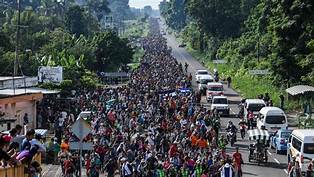From FAIR: First Caravan of 2020 Departs from Honduras
More than 2000 migrants are trekking from San Pedro de Sula, Honduras, to the U.S.-Mexico border in order to seek asylum in the United States –a recurring theme at the southern border.
The caravan, mostly comprised of Honduran migrants, entered Guatemala last week while waving Honduran flags and shouting national slogans.
But rather than letting the group pass through with ease, Guatemalan officials, along with U.S. Customs and Immigration Enforcement (ICE), stopped migrants to check their travel documents and deported those with insufficient paperwork.
Many caravan members cited domestic poverty and gang violence as reasons to leave their home countries, but neither of those reasons qualify for asylum in the U.S. To qualify for asylum, an individual must establish a well-founded fear of persecution by their government based on race, religion, nationality, political opinion, or membership in a particular social group.
It’s unclear when the caravan will reach the United States, but the Trump administration has implemented a series of initiatives that reduce the likelihood of this caravan or future caravans from entering the United States.
These initiatives include the Migrant Protection Protocols (MMPs), safe third country agreements with regional partners, and increased pressure on regional partners to better enforce their immigration laws. Ultimately, these combined efforts will help deter those with fraudulent asylum claims.
Congressional Budget Office Reveals Low-Skill Foreign Labor Hurting Americans Workers
The non-partisan Congressional Budget Office (CBO) recently released a report on the effects of mass migration on the U.S. economy. Below are three key findings you must know today:
- “Among people with less education, a large percentage are foreign born. Consequently, immigration has exerted downward pressure on the wages of relatively low-skilled workers who are already in the country, regardless of their birthplace.”
- “The effects of immigration on wages depend on the characteristics of the immigrants. To the extent that newly arrived workers have abilities similar to those of workers already in the country, immigration would have a negative effect on wages.”
- “Differences among unemployment rates of groups may be affected by educational attainment-which has been lower among people from Mexico and Central America, and higher among people from Asia, than among people who are native born.”
Current levels of immigration, which are roughly one million annually, are negatively impacting the U.S. economy. The CBO does not make policy recommendations, but a blueprint for needed reforms already exists. For wages to increase more, the Trump administration should look to significantly reduce annual immigration, as recommended by the bipartisan commission chaired by the late Barbara Jordan under the Clinton administration.
The commission also recommended ending family chain migration and transitioning to a merit-based selection process. Merit-based immigration would admit newcomers based on an objective assessment of how their skills and education would complement the existing workforce. As the CBO report finds, the failure to do so is gravely harming our most vulnerable workers.
The CBO report looks at the impact of all foreign-born residents. As such, it does not break out the effects of illegal immigration. However, the presence of millions of illegal workers in the labor force disproportionally harms the lower-skilled Americans cited by the CBO. It also harms American taxpayers who incur about $135 billion in costs each year as a result of large-scale illegal immigration, according to an analysis by FAIR.















